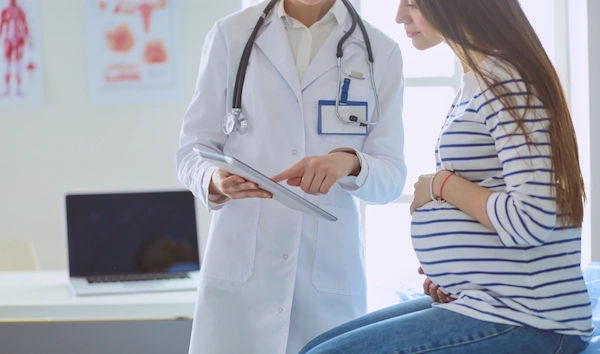Guide to How Much Tea Can I Have During Pregnancy
Concerned about tea consumption while pregnant? Get a clear guide on safe limits for caffeine and specific teas (herbal, green, black) to ensure a healthy pregnancy.

Written by Dr. Mohammed Kamran
Reviewed by Dr. Shaik Abdul Kalam MD (Physician)
Last updated on 2nd Feb, 2026

Introduction
Tea can be a comforting ritual—especially when you’re expecting. But many parents-to-be wonder exactly how much tea is safe during pregnancy, which types are okay, and how to manage caffeine and herbal blends smartly. This guide brings together what top medical and maternal-health sources say, and adds clear, practical strategies you can use every day. You’ll learn how much tea you can have during pregnancy without exceeding recommended caffeine limits, which herbal teas are generally considered safe (and which to avoid), how tea can affect iron and folate, and how to tailor your choices if you have nausea, reflux, anemia, or other concerns. We include evidence-based tips, sample daily plans, and unique insights—like timing your tea away from meals to protect iron levels. You’ll also find quick takeaways, FAQs, and references to authoritative sources so you can sip with confidence through pregnancy.
How Much Tea Is Safe During Pregnancy?
Most experts recommend keeping total caffeine under 200 mg per day in pregnancy. That’s roughly:
- Black tea (8 oz/240 ml brewed): about 40–50 mg per cup
- Green tea (8 oz): about 20–35 mg per cup
- Oolong/white tea (8 oz): typically 20–40 mg per cup
- Chai (8 oz, brewed): often 30–60 mg per cup (varies with recipe)
- Matcha (8 oz): can be 60–80 mg per cup (varies widely)
- Decaf black/green tea (8 oz): about 2–5 mg per cup
Estimates vary by brand, leaf grade, water temperature, steep time, and mug size. If you drink coffee, colas, energy drinks, or chocolate, count those toward your 200 mg/day total too. A simple, safe daily pattern is:
- Up to 2 cups of black tea OR up to 3 cups of green/white tea
- Plus 1–3 cups of naturally caffeine-free herbal tea (from safe options)
- Or choose decaf versions to enjoy more cups with minimal caffeine
Pro tips:
- Use smaller mugs (6–8 oz), watch steep time, and choose lighter styles to keep caffeine lower.
- If you drink tea for nausea or relaxation, choose caffeine-free herbal blends known to be safe.
If you notice palpitations, jitteriness, or sleep issues, reduce caffeinated tea and consider decaf or herbal options. If symptoms persist beyond two weeks, consult a doctor online with Apollo 24|7 for further evaluation.
Consult Top Specialists Here
Understanding Caffeine in Tea: What Affects the Number
Tea caffeine isn’t fixed—it depends on:
- Type of tea and leaf grade: Broken leaves and tea bags often yield higher caffeine. Matcha uses the whole leaf powder,
boosting caffeine per serving. - Steep time and water temperature: Longer steeps and hotter water extract more caffeine. Keeping steeps to 2–3 minutes
for black tea and 1–2 minutes for green tea can reduce caffeine. - Serving size: Many home mugs are 10–12 oz, not 8 oz. A “cup” on labels often means 8 oz.
- Brewing method: Cold brew may extract less caffeine, but not always; cold-steeped tea can still be significant over long times.
Typical caffeine ranges, per Mayo Clinic and other sources, are: black tea ~47 mg per 8 oz, green tea ~28 mg, oolong ~37 mg, decaf tea ~2–5 mg, with matcha commonly higher per serving. In pregnancy, caffeine metabolism slows; caffeine’s half-life can more than double later in pregnancy, meaning the same amount may stay in your system longer and affect sleep or palpitations more noticeably. Spacing your caffeinated tea throughout the day (rather than all at once) can lessen peaks while keeping your daily total under 200 mg.
Consult Top Specialists Here
Herbal Teas in Pregnancy: Safe Choices and What to Avoid?
Herbal teas can be naturally caffeine-free, but “natural” doesn’t always mean “safe in pregnancy.” Large or concentrated amounts of some herbs have been linked with uterine stimulation, liver toxicity, or other risks. Many authorities recommend cautious use and discussing herbal products with your clinician.
Generally considered safe in moderation (1–3 cups/day):
- Ginger: Helpful for nausea; try fresh slices or pure ginger tea.
- Peppermint: Soothing for bloating; may worsen reflux for some.
- Rooibos: Naturally caffeine-free, rich color and flavor.
- Lemon balm or chamomile: Mildly calming; true chamomile allergies are possible. Use food-grade products.
- Fruit or spice infusions without risky herbs (e.g., apple-cinnamon, rosehip).
Use with caution or avoid unless advised by a clinician:
- Raspberry leaf: Traditionally suggested in late pregnancy; evidence for labor effects is limited, and safety data are not robust. Many clinicians suggest avoiding until the third trimester and using modestly.
- Licorice root: High intake has been linked to adverse pregnancy outcomes; avoid.
Sage (especially oil/concentrates), pennyroyal, comfrey, dong quai: Associated with toxicity or uterine effects; avoid. - Ginseng: Mixed safety data; generally avoided in pregnancy.
- High-dose hibiscus and certain “detox” or slimming blends: Avoid due to limited safety data or potential uterotonic
effects.
Key tips:
- Choose single-herb teas so you know what you’re drinking.
- Read labels: “Proprietary blends” may hide ingredients like licorice root.
- Limit to culinary-strength teas (typical tea-bag strength), not concentrated tinctures.
If you experience persistent symptoms such as ongoing vomiting, dehydration, or severe heartburn, book a physical visit to a doctor with Apollo 24|7. For anemia concerns, Apollo 24|7 offers a convenient home collection for tests like hemoglobin and ferritin.
Your Tea-by-Tea Guide: Black, Green, White, Oolong, Matcha, Chai, Iced, Decaf
Black tea
- Caffeine: About 40–50 mg per 8 oz; higher with strong/broken-leaf blends.
- How much: 2 cups/day keeps you well under 200 mg if you’re not consuming other caffeine.
- Watch-outs: Avoid drinking with iron-rich meals; tannins can inhibit iron absorption. If reflux is an issue, choose milder brews and add milk to reduce acidity perception.
Green tea
- Caffeine: ~20–35 mg per 8 oz.
- Special note: Green tea catechins (EGCG) may interact with folate metabolism in vitro. While clinical significance at
modest intakes is unclear, spacing green tea and your prenatal (folic acid) by a few hours is a sensible precaution,
especially in the first trimester. - How much: 3 cups/day typically fits under 200 mg if no other caffeine sources.
White and oolong tea
- Caffeine: Generally similar to lighter green teas (20–40 mg), but varies by brand and brewing.
- How much: 2–3 cups/day usually fit comfortably within limits.
Matcha
- Caffeine: Often 60–80 mg per 8 oz, but can be higher due to whole-leaf powder and portion size. Café lattes may use 2 grams or more of powder.
- How much: 1 cup/day can be a reasonable ceiling if you also drink another caffeinated beverage.
- Extra considerations: Choose reputable brands and moderate intake. Because you ingest the entire leaf, matcha can contain more of any contaminants than steep-and-discard teas. Limit to 1 cup/day and prioritize quality.
Chai (spiced black tea)
- Caffeine: Typically 30–60 mg per 8 oz, depending on the tea-to-milk ratio.
- Spice safety: Most culinary spices (ginger, cinnamon, cardamom) are fine in food-like amounts. Avoid blends with
licorice root. - Tip: A “half-caf” chai (half decaf black tea) keeps flavor with less caffeine.
Iced tea and bottled tea
- Caffeine: Varies widely; sweetened bottled teas can range from 15–70 mg per serving. Check labels and serving sizes.
- Watch sugar: Choose unsweetened or lightly sweetened options.
Decaf tea
- Caffeine: About 2–5 mg per cup.
- How much: Decaf lets you enjoy multiple cups with negligible caffeine. Blend decaf with regular to fine-tune intake.
Timing Tea to Protect Iron and Folate
Two nutrients are top-of-mind in pregnancy: iron and folate. Tea can influence both through its natural compounds.
Iron absorption
- Tea’s polyphenols (tannins) can reduce non-heme iron absorption when consumed with meals. The NHS advises
avoiding tea and coffee with meals for this reason. - Practical plan: Drink tea at least 1 hour before or after meals and 2 hours away from iron supplements to support
absorption. Add lemon or pair iron-rich foods with vitamin C-rich sides (citrus, bell peppers) to boost iron uptake.
Folate and green tea catechins
- Some catechins (like EGCG) can inhibit enzymes involved in folate metabolism in lab studies. Human evidence is limited, but it’s reasonable to separate green tea from your prenatal vitamin by a few hours, particularly early in pregnancy when folate is critical.
- Pro move: Take your prenatal with water at breakfast; enjoy green tea mid-morning. Or have your caffeinated tea earlier and your prenatal at night.
Managing Nausea, Reflux, and Sleep with Tea Choices
Nausea (morning sickness)
- Helpful teas: Ginger tea is a classic option for mild nausea and can be sipped slowly throughout the day. Peppermint
may also soothe queasiness, though it can aggravate reflux for some. - Strategy: Keep ginger tea bags or fresh ginger slices in your bag. Small, frequent sips and dry crackers can settle the
stomach.
Reflux (heartburn)
- What to avoid: Strong black tea, peppermint, and very hot beverages may worsen reflux in some people.
- Try this: Weak black tea with milk, rooibos, or chamomile sipped warm (not hot). Time tea at least 1–2 hours after
dinner to reduce nighttime reflux.
Sleep and restlessness
- Caffeine clearance slows in pregnancy, especially late in the third trimester. If sleep is disturbed, cap caffeinated tea by
early afternoon and switch to herbal infusions by evening. - Consider: Decaf tea after 3–4 pm, or calming options like lemon balm or chamomile. If insomnia persists beyond two weeks, consult a doctor online with Apollo 24|7 for personalized guidance.
Hydration and cravings
- Tea counts toward fluids, but balances with water. If you crave sweet milk tea, consider half-sweet versions or spice-forward chai with minimal sugar.
A Practical Day of Tea During Pregnancy (Examples)
Sample Day 1 (balanced caffeine)
- 8:30 am: 1 cup black tea (8 oz) with milk (~40–50 mg)
- 11:00 am: 1 cup ginger tea (caffeine-free)
- 2:30 pm: 1 cup green tea (8 oz) (~20–30 mg)
- 7:30 pm: 1 cup chamomile or rooibos (caffeine-free)
- Total caffeine: roughly 60–80 mg
Sample Day 2 (matcha fan)
- 9:00 am: 1 small matcha latte (6–8 oz; ~50–70 mg depending on powder)
- 1:00 pm: 1 cup decaf black tea with lemon (~2–5 mg)
- 4:00 pm: 1 cup peppermint or lemon balm (caffeine-free)
- Total caffeine: roughly 55–75 mg
Sample Day 3 (low caffeine)
- 8:00 am: 1 cup white or lightly brewed green tea (~15–25 mg)
- 10:30 am: 1 cup rooibos (caffeine-free)
- 3:00 pm: 1 cup decaf chai (~2–5 mg)
- 8:00 pm: 1 cup ginger tea (caffeine-free)
- Total caffeine: roughly 20–30 mg
Tip: Separate caffeinated tea from your prenatal and iron-rich meals by a few hours to support iron and folate. If you often feel lightheaded or fatigued, discuss testing for anemia; Apollo 24|7 offers home collections for hemoglobin and ferritin.
Label Literacy and Brewing Tips to Reduce Caffeine
- Check serving size: If your mug is 12 oz, you’re getting roughly 1.5 times the caffeine listed per 8 oz.
- Leaf size matters: Whole-leaf teas tend to extract more slowly; dust/fannings in tea bags can brew stronger, faster.
- Temperature and time: Brew black tea at 90–95°C (194–203°F) for 2–3 minutes; green tea at 75–85°C (167–185°F) for
1–2 minutes. Shorter steeps = less caffeine. - Rinse method: A 10–15 second pre-infusion pour reduces early caffeine release.
- “Half-caf” blends: Mix regularly with decaf leaves to cut caffeine while keeping flavor.
- Choose naturally caffeine-free infusions (rooibos, ginger, fruit infusions) to round out your day.
Special Situations: Tailoring Tea in Common Pregnancy Scenarios
Anemia or low iron: Avoid tea with meals; choose water or vitamin C-rich drinks at mealtimes. Keep caffeinated tea to
mid-morning/afternoon. Consider rooibos or ginger at lunch. If fatigue persists, Apollo 24|7 offers home blood tests to
check iron status.
Gestational hypertension: Caffeine can modestly increase blood pressure in some individuals. Keep intake well below 200 mg/day or consider mostly decaf/herbal, and monitor your readings. Consult your obstetrician for personalized advice.
Gestational diabetes: Watch added sugars in milk tea, bottled tea, and chai. Opt for unsweetened teas or use small
amounts of honey or date syrup as tolerated.
Thyroid concerns: High-tannin beverages may affect the absorption of levothyroxine if taken together. Take thyroid medication with water on an empty stomach and wait at least 30–60 minutes before any tea.
Hyperemesis gravidarum: Small sips of cold ginger tea or ice chips flavored with lemon can help with hydration. If you can’t keep fluids down, seek urgent care; Apollo 24|7 can help arrange a clinician visit.
Third Trimester and Raspberry Leaf Tea: What’s the Evidence?
Raspberry leaf tea is often promoted for toning the uterus or shortening labor. Research remains limited and mixed. Some small studies suggest potential effects on the length of second-stage labor, while others find no meaningful benefit; high-quality evidence is lacking, and safety data are not robust enough for routine early-pregnancy use. Many clinicians recommend:
- Avoid before the third trimester.
- If you choose to try it in late pregnancy, keep to modest amounts (e.g., 1 cup/day), and discuss with your obstetric
provider—especially if you have a history of preterm labor, uterine irritability, or complications. - When in doubt, stick with well-established safe herbal options like rooibos or ginger, and focus on hydration, rest, and balanced nutrition.
Conclusion
Tea can absolutely be part of a healthy pregnancy when you know the numbers and choose wisely. Aim to keep total caffeine under 200 mg per day, which typically means up to two cups of black tea or three cups of green or white tea, depending on strength and mug size. Round out your day with safe herbal choices like ginger, rooibos, or chamomile, and time your tea at least an hour away from iron-rich meals and prenatal vitamins to protect iron and folate status. If you love stronger options like matcha or chai, enjoy them in smaller, well-planned servings—and consider decaf swaps to keep your ritual without the jitters. Pay attention to how your body feels; if sleep, palpitations, or reflux become a pattern, scale back on caffeine and talk to a clinician. And if you have anemia, thyroid medication, gestational hypertension, or diabetes, a few simple adjustments—plus appropriate testing—can help tailor your tea plan to your needs. With the right strategies, you can enjoy the comfort and flavor of tea throughout pregnancy while keeping you and your baby’s health front and center. If your condition does not improve after trying these methods, book a physical visit to a doctor with Apollo 24|7 for personalized guidance.
Consult Top Specialists Here
Consult Top Specialists Here

Dr. Parul Sharma
Obstetrician and Gynaecologist
8 Years • MBBS, MS (Obstetrics & Gynaecology)
New Delhi
THE DOCTORS NESST, New Delhi

Dr. Debajyoti Goswami
Obstetrician and Gynaecologist
10 Years • MBBS,D.G.O(DNB),Adv. Infertility Tech.(AIIMS),Fellowship in Diabetes(U.K),Comprehensive Abortion Care(Govt. Of W.B), Certificate in Clinical Embryology(AIIMS, BHUBANESWAR)
Bankura
D.G Clinic, Bankura
(25+ Patients)

Dr. Asha Rani Singh
Obstetrician and Gynaecologist
24 Years • MBBS DGO
Delhi
Dr Asha Rani Singh Clinic, Delhi

Dr. Shyamala Devi
Obstetrician and Gynaecologist
38 Years • MBBS, MS Obstetrics & Gynaecology
Vijayawada
Sri Shivshakti Nilayam, Vijayawada
Dr. K Anusha
Obstetrician and Gynaecologist
4 Years • MBBS, DGO
Yemmiganur
SRINIVASAA HOSPITAL, Yemmiganur
Consult Top Specialists Here

Dr. Parul Sharma
Obstetrician and Gynaecologist
8 Years • MBBS, MS (Obstetrics & Gynaecology)
New Delhi
THE DOCTORS NESST, New Delhi

Dr. Debajyoti Goswami
Obstetrician and Gynaecologist
10 Years • MBBS,D.G.O(DNB),Adv. Infertility Tech.(AIIMS),Fellowship in Diabetes(U.K),Comprehensive Abortion Care(Govt. Of W.B), Certificate in Clinical Embryology(AIIMS, BHUBANESWAR)
Bankura
D.G Clinic, Bankura
(25+ Patients)

Dr. Asha Rani Singh
Obstetrician and Gynaecologist
24 Years • MBBS DGO
Delhi
Dr Asha Rani Singh Clinic, Delhi

Dr. Shyamala Devi
Obstetrician and Gynaecologist
38 Years • MBBS, MS Obstetrics & Gynaecology
Vijayawada
Sri Shivshakti Nilayam, Vijayawada
Dr. K Anusha
Obstetrician and Gynaecologist
4 Years • MBBS, DGO
Yemmiganur
SRINIVASAA HOSPITAL, Yemmiganur
More articles from pregnancy
Frequently Asked Questions
1) Is decaf tea completely caffeine-free in pregnancy?
No. Decaf tea still contains about 2–5 mg per 8 oz. It’s a good choice to lower overall caffeine while keeping the taste. Track total daily caffeine from all sources.
2) Can I drink matcha during pregnancy?
Yes, in moderation. Matcha often has 60–80 mg per 8 oz serving or more. Limit to about one cup a day, choose reputable brands, and account for other caffeine sources.
3) Which herbal teas are safe while pregnant?
Ginger, rooibos, chamomile, lemon balm, and many fruit infusions are generally considered safe in moderation. Avoid licorice root, pennyroyal, comfrey, dong quai, and high-dose sage. Use raspberry leaf cautiously in the third trimester and consult your provider.
4) Does tea affect iron absorption during pregnancy?
Yes. Tea’s tannins reduce non-heme iron absorption when taken with meals. Drink tea 1–2 hours away from iron-rich meals or supplements. If you’re concerned about anemia, Apollo 24|7 offers home collection for hemoglobin and ferritin testing.
5) How can I reduce caffeine in my tea without giving it up?
Use smaller cups, shorter steeps, lighter teas, or a quick “leaf rinse.” Blend regular with decaf. Switch to herbal or decaf after midday to protect sleep.




